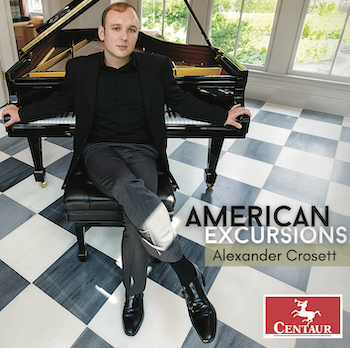Classical Music Album Review: “American Excursions” — A Worthy Huzzah to Our 250th Anniversary
By Jonathan Blumhofer
American Excursions manages — and in a brisk 59 minutes — to provide an impressive degree of racial, gender, and stylistic diversity.

Doing justice to American music can be a heavy lift. Consider the Boston Symphony Orchestra, whose E Pluribus Unum festival next season features four orchestral programs that include exactly one work by a woman (Allison Loggins-Hull) and none by an American born before 1910.
Like the BSO, pianist Alexander Crosett’s album American Excursions isn’t looking to provide a comprehensive cross-section of 250 years of musical history: its oldest composer, Dana Suesse, was only born in 1909. But it does manage — and in a brisk 59 minutes — to provide an impressive degree of racial, gender, and stylistic diversity.
That all of its offerings lean into various forms of pop music, jazz, folk song, and the blues means that the nation’s grittier heritage (think Copland’s Piano Variations or Ives’s Concord Sonata) doesn’t really register. But there’s so much going on here — and, by and large, it’s so well played — that one is happy to take what one can, especially since Crosett plumbs some offbeat fare with palpable enthusiasm.
The album’s most substantial repertoire staple must be Samuel Barber’s Excursions. Written in 1945, the four-movement effort marries classical and popular forms, most notably the blues and fiddle music. Though the thought of Barber — in so many ways, the picture of elite, urban propriety — toying with Black and rural styles may reek of appropriation, the musical results are quite captivating.
Crosett’s account of Excursions’ funky second movement is deliciously soulful, while his take on the Allegretto, with its allusions to Latin musical forms, is a model of sweet, dancing naïveté. Meanwhile, the finale’s jaunty energy mirrors the opening section’s dry, motoric wit.
That one, with its dry tone and well-directed spirit, echoes — rather surprisingly — the album’s most recent number, Karen Tanaka’s Techno Etudes II. Drawing on a range of influences, from trance music to the Korean boy band BTS, the California-based, Tokyo-born composer has crafted a brash, swaggering triptych that’s, frankly, a hell of a lot of fun to listen to.
The performances are, in the outer movements, slashing and pulsing. But Crosett also draws out a range of colors from the sputtering, shimmering central movement, with its ominously lurking low-tessitura figurations.
Crosett mines more than a little character, too, from Gabriela Lena Frank’s Barcarola Latinoamericana, with its acidic Chopin allusions and Gershwin-esque turns. Much the same can be said for his take on Mary Ellen Childs’s Now (a paraphrase of songs from Stephen Sondheim’s A Little Night Music) and Suesse’s enchanting Serenade to a Skyscraper. The last may be no masterpiece — but it’s a charmer, all the same.
The album’s biggest installment, though, is Fred Hersch’s 24 Variations on a Bach Chorale. Written in the aftermath of the 9/11 attacks, the effort pays tribute to Hersch’s work as a jazz artist as much as his background as a classically trained musician: the writing is rife with references to Brahms, Rachmaninoff, and Schubert.
Crosett’s performance is a labor of love, though it doesn’t quite salvage the Variations’ handful of trite moments, which are mainly a result of brevity. To wit: the Brahms-ish fifth variation still feels too short and the 15th trivial.
But so much more goes right here. The second variation is perfectly limber, while the third churns quietly. No. 6 is touchingly sultry, No. 12 softly ecstatic, and the spicy progressions in No. 16 all speak. While there’s no rhyme or reason to the separation of variations 22 and 23, they eventually lead to a grand reprise of the chorale that wraps this recording triumphantly.
Centaur’s engineering is generally good, though there are moments in which Crosett’s Steinway sounds a bit distant and two-dimensional (like in the finale of Excursions). Nevertheless, his playing is always clear, well directed, and firmly voiced. Add to this excellent, informative liner notes by the pianist (who’s on the faculty of Berklee College of Music), and we’ve got a fine release that’s fully worthy of the national birthday to be celebrated over the coming months.
Jonathan Blumhofer is a composer and violist who has been active in the greater Boston area since 2004. His music has received numerous awards and been performed by various ensembles, including the American Composers Orchestra, Kiev Philharmonic, Camerata Chicago, Xanthos Ensemble, and Juventas New Music Group. Since receiving his doctorate from Boston University in 2010, Jon has taught at Clark University, Worcester Polytechnic Institute, and online for the University of Phoenix, in addition to writing music criticism for the Worcester Telegram & Gazette.
